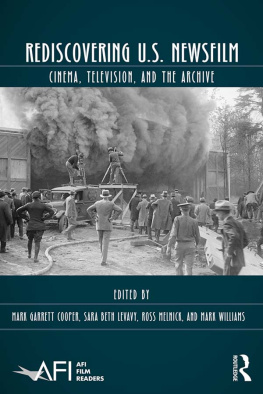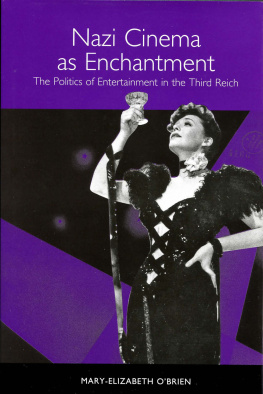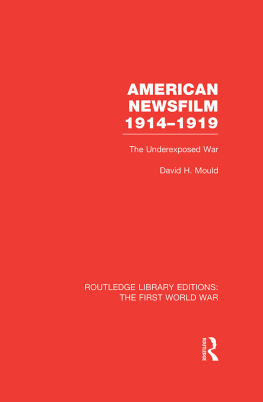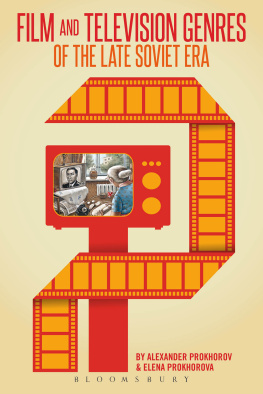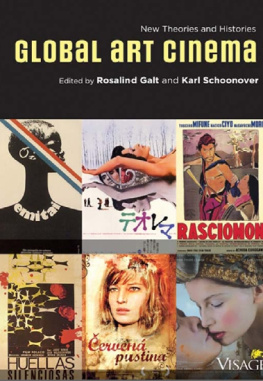Rediscovering U.S. Newsfilm
The twentieth century generated tens of thousands of hours of American newsfilm but not the scholarly apparatus necessary to analyze and contextualize them. Assembling new approaches to the study of U.S. newsfilm in cinema and television, this book makes a long overdue critical intervention in the field of film and media studies by addressing the formats inherent intermediality; its mediation of events for local, national, and transnational communities; its distinctive archival legacies; and, consequently, its integral place in film and television studies more broadly. This collection brings fresh, contemporary methodologies and analysis to bear on a vast amount of material that has languished in relative obscurity for far too long.
Mark Garrett Cooper is a Professor of Film and Media Studies at the University of South Carolina, USA.
Sara Beth Levavy is a scholar of Film, Media, and Art History.
Ross Melnick is an Associate Professor of Film and Media Studies at University of California, Santa Barbara, USA.
Mark Williams is an Associate Professor of Film and Media Studies at Dartmouth College, USA.
Previously published in the AFI Film Readers series
Edited by Edward Branigan and Charles Wolfe
World Cinemas, Transnational Perspectives
Nataa uroviov and Kathleen Newman
Documentary Testimonies
Bhaskar Sarkar and Janet Walker
Slapstick Comedy
Rob King and Tom Paulus
The Epic Film in World Culture
Robert Burgoyne
Arnheim for Film and Media Studies
Scott Higgins
Color and the Moving Image
Simon Brown, Sarah Street, and Liz Watkins
Ecocinema Theory and Practice
Stephen Rust, Salma Monani, and Sean Cubitt
Media Authorship
Cynthia Chris and David A. Gerstner
Pervasive Animation
Suzanne Buchan
The Biopic in Contemporary Film Culture
Tom Brown and Beln Vidal
Cognitive Media Theory
Ted Nannicelli and Paul Taberham
Hollywood Puzzle Films
Warren Buckland
Endangering Science Fiction Film
Sean Redmond and Leon Marvell
New Silent Cinema
Paul Flaig and Katherine Groo
Teaching Transnational Cinema
Katarzyna Marciniak and Bruce Bennett
Fantasy/Animation
Edited by Christopher Holliday and Alexander Sergeant
For a full list of titles in this series, please visit www.routledge.com
Rediscovering U.S. Newsfilm
Cinema, Television, and the Archive
Edited by
Mark Garrett Cooper, Sara Beth Levavy, Ross Melnick, and Mark Williams
First published 2018
by Routledge
711 Third Avenue, New York, NY 10017
and by Routledge
2 Park Square, Milton Park, Abingdon, Oxon OX14 4RN
Routledge is an imprint of the Taylor & Francis Group, an informa business
2018 American Film Institute
The right of the editors to be identified as the author of the editorial material, and of the authors for their individual chapters, has been asserted in accordance with sections 77 and 78 of the Copyright, Designs and Patents Act 1988.
All rights reserved. No part of this book may be reprinted or reproduced or utilised in any form or by any electronic, mechanical, or other means, now known or hereafter invented, including photocopying and recording, or in any information storage or retrieval system, without permission in writing from the publishers.
Trademark notice: Product or corporate names may be trademarks or registered trademarks, and are used only for identification and explanation without intent to infringe.
Library of Congress Cataloging-in-Publication Data
A catalog record for this book has been requested
ISBN: 978-1-138-69945-8 (hbk)
ISBN: 978-1-315-51673-8 (ebk)
Typeset in Spectrum MT
by Apex CoVantage, LLC
contents
mark garrett cooper, sara beth levavy, ross melnick, and mark williams
part one
newsfilm and the news
greg wilsbacher
sara beth levavy
kenneth hough
michael aronson
aniko bodroghkozy
thomas a. mascaro
part two
newsfilm geographies
richard abel
jennifer peterson
joseph clark
ross melnick
caroline frick
part three
into the archives
blaine m. bartell
greg wilsbacher
ellen mulligan and carol swain
mark quigley
amy meaney
ruta abolins
karen cariani
dan streible
shawn vancour
mark williams
mark garrett cooper and jaimie baron
mark garrett cooper, elaine chun, stanley dubinsky, and tracey l. weldon
Every newsreel was produced by a geographically dispersed body of unheralded and uncredited players. This book is similarly endowed. Specific gratitude, then, is certainly in order.
First, we would like to thank our enormously supportive series editors Chuck Wolfe and Edward Branigan. From this projects earliest conception, Chuck guided us toward a tightly focused collection. We also thank Routledge editor Felisa Salvago-Keyes and senior editorial assistant Christina Kowalski for supporting this project from the start, especially as the table of contents shifted over time. We are particularly grateful for the fluid process of production and Routledges keen attention to every detail of this book.
Our anonymous outside readers also materially shaped the books development and encouraged our dedication to cultivating contributions that demonstrate newsfilms centrality to our field and to many others. We thank them for their invaluable feedback on our proposal.
This book also owes a debt to those scholars who have previously focused on newsfilm in the U.S. and around the globe. We are enormously grateful to Raymond Fielding for his seminal works The American Newsreel (1972) and The March of Time (1978). Thomas Doherty also merits special thanks for keeping newsfilm on the agenda for film and media studies. Though this volume works exclusively with U.S. newsfilm, it owes a debt to scholars such as Clyde Jeavons, Jane Mercer, and Daniela Kirchner; Luke McKernan; Brian Winston; and Mats Jnsson, Lars-M. Srensen, and Tore Helseth (co-founders of The Newsreel Network) who have energized the study of European newsfilm as a resource for investigations of history, politics, war, identity, society, culture, and many other vital subjects.
If this book can be dedicated to anyone, though, it is to the archivists and librarians who steward these invaluable collections. With every new publication that makes use of materials in their care, the centrality of newsfilm to (media) historiography and to our complex history becomes more evident. We thank them for making this book possible, for contributing to this work, and for protecting this material for future scholars and media makers.
Finally, Ross would like to thank Noa Bolozky and Mark Williams, Mary Desjardins for allowing them to check urgent emails during meals, for enduring early morning alarms for editorial conference calls, and for countenancing late-night writing and editing sessions. All of these bad habits, were afraid to say, will continue.

